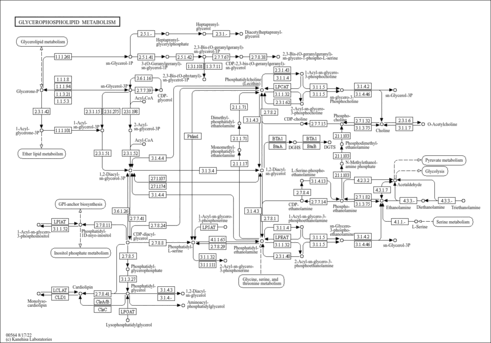| Record Information |
|---|
| Version | 1.0 |
|---|
| Created at | 2020-03-30 18:14:29 UTC |
|---|
| Updated at | 2020-12-07 19:08:07 UTC |
|---|
| CannabisDB ID | CDB001260 |
|---|
| Secondary Accession Numbers | Not Available |
|---|
| Cannabis Compound Identification |
|---|
| Common Name | CL(16:0/16:0/16:0/16:0) |
|---|
| Description | CL(16:0/16:0/16:0/16:0), also known as Cardiolipin(64:0) or CL(64:0), belongs to the class of organic compounds known as cardiolipins. These are glycerophospholipids in which the O1 and O3 oxygen atoms of the central glycerol moiety are each linked to one 1,2-diacylglycerol chain. Their general formula is OC(COP(O)(=O)OC[C@@H](CO[R1])O[R2])COP(O)(=O)OC[C@@H](CO[R3])O[R4], where R1-R4 are four fatty acyl chains. Thus, CL(16:0/16:0/16:0/16:0) is considered to be a glycerophosphoglycerophosphoglycerol lipid molecule. CL(16:0/16:0/16:0/16:0) is a very hydrophobic molecule, practically insoluble (in water), and relatively neutral. This compound is expected to be in Cannabis as all living plants are known to produce and metabolize it. |
|---|
| Structure | |
|---|
| Synonyms | | Value | Source |
|---|
| 1,1',2,2'-Tetrahexadecanoyl cardiolipin | ChEBI | | 1,1',2,2'-Tetrapalmitoyl cardiolipin | ChEBI | | Cardiolipin (tetrahexadecanoyl, N-C16:0) | ChEBI | | Cardiolipin(16:0/16:0/16:0/16:0) | ChEBI | | Cardiolipin(64:0) | ChEBI | | CL(1'-[16:0/16:0],3'-[16:0/16:0]) | ChEBI | | CL(64:0) | ChEBI | | Tetrapalmitoyl cardiolipin | ChEBI | | 1'-[1,2-Dipalmitoyl-rac-glycero-3-phospho],3'-[1,2-dipalmitoyl-rac-glycero-3-phospho]-glycerol | HMDB | | 1'-[1,2-Dihexadecanoyl-rac-glycero-3-phospho],3'-[1,2-dihexadecanoyl-rac-glycero-3-phospho]-glycerol | HMDB | | CL(16:0/16:0/16:0/16:0) | Lipid Annotator |
|
|---|
| Chemical Formula | C73H142O17P2 |
|---|
| Average Molecular Weight | 1353.87 |
|---|
| Monoisotopic Molecular Weight | 1352.9722 |
|---|
| IUPAC Name | [(2R)-2,3-bis(hexadecanoyloxy)propoxy][3-({[(2R)-2,3-bis(hexadecanoyloxy)propoxy](hydroxy)phosphoryl}oxy)-2-hydroxypropoxy]phosphinic acid |
|---|
| Traditional Name | (2R)-2,3-bis(hexadecanoyloxy)propoxy(3-{[(2R)-2,3-bis(hexadecanoyloxy)propoxy(hydroxy)phosphoryl]oxy}-2-hydroxypropoxy)phosphinic acid |
|---|
| CAS Registry Number | Not Available |
|---|
| SMILES | [H]C(O)(COP(O)(=O)OC[C@@]([H])(COC(=O)CCCCCCCCCCCCCCC)OC(=O)CCCCCCCCCCCCCCC)COP(O)(=O)OC[C@@]([H])(COC(=O)CCCCCCCCCCCCCCC)OC(=O)CCCCCCCCCCCCCCC |
|---|
| InChI Identifier | InChI=1S/C73H142O17P2/c1-5-9-13-17-21-25-29-33-37-41-45-49-53-57-70(75)83-63-68(89-72(77)59-55-51-47-43-39-35-31-27-23-19-15-11-7-3)65-87-91(79,80)85-61-67(74)62-86-92(81,82)88-66-69(90-73(78)60-56-52-48-44-40-36-32-28-24-20-16-12-8-4)64-84-71(76)58-54-50-46-42-38-34-30-26-22-18-14-10-6-2/h67-69,74H,5-66H2,1-4H3,(H,79,80)(H,81,82)/t68-,69-/m1/s1 |
|---|
| InChI Key | GRTNLBQYBYZCCM-ULKDXPJMSA-N |
|---|
| Chemical Taxonomy |
|---|
| Description | Belongs to the class of organic compounds known as cardiolipins. These are glycerophospholipids in which the O1 and O3 oxygen atoms of the central glycerol moiety are each linked to one 1,2-diacylglycerol chain. Their general formula is OC(COP(O)(=O)OC[C@@H](CO[R1])O[R2])COP(O)(=O)OC[C@@H](CO[R3])O[R4], where R1-R4 are four fatty acyl chains. |
|---|
| Kingdom | Organic compounds |
|---|
| Super Class | Lipids and lipid-like molecules |
|---|
| Class | Glycerophospholipids |
|---|
| Sub Class | Glycerophosphoglycerophosphoglycerols |
|---|
| Direct Parent | Cardiolipins |
|---|
| Alternative Parents | |
|---|
| Substituents | - Cardiolipin
- Tetracarboxylic acid or derivatives
- Fatty acid ester
- Dialkyl phosphate
- Organic phosphoric acid derivative
- Phosphoric acid ester
- Alkyl phosphate
- Fatty acyl
- Carboxylic acid ester
- Secondary alcohol
- Carboxylic acid derivative
- Organooxygen compound
- Alcohol
- Organic oxide
- Organic oxygen compound
- Hydrocarbon derivative
- Carbonyl group
- Aliphatic acyclic compound
|
|---|
| Molecular Framework | Aliphatic acyclic compounds |
|---|
| External Descriptors | Not Available |
|---|
| Ontology |
|---|
|
| Physiological effect | Organoleptic effect: |
|---|
| Disposition | Route of exposure: Biological location: Source: |
|---|
| Role | Biological role: Industrial application: |
|---|
| Physical Properties |
|---|
| State | Solid |
|---|
| Experimental Properties | | Property | Value | Reference |
|---|
| Melting Point | Not Available | Not Available | | Boiling Point | Not Available | Not Available | | Water Solubility | Not Available | Not Available | | logP | Not Available | Not Available |
|
|---|
| Predicted Properties | [] |
|---|
